“From Borehamwood, via Barnet, to the Moselle”
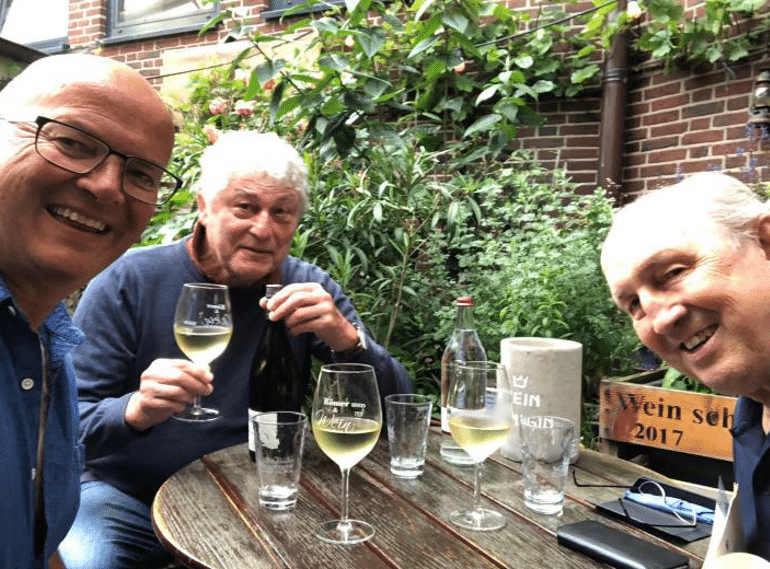
Tony Norman has, he says, much reason to be grateful to Queen Elizabeth’s School, since “apart from getting me to university, the School also gave me my first taste of overseas travel”.
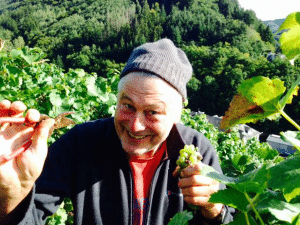 This “taste” consisted of “a third-form summer trip [Year 9, in today’s parlance] to Denmark and Sweden, and later the exchange visits with Dortmund and Berlin”.
This “taste” consisted of “a third-form summer trip [Year 9, in today’s parlance] to Denmark and Sweden, and later the exchange visits with Dortmund and Berlin”.
And it was these trips, with their opportunities to sample other cultures, that set the course for a career that has seen him live and work in various countries, including Sweden and Germany. Now retired, Tony (OE 1955–1962) splits his time between the UK, Frankfurt and the Moselle valley, “where I own a delightful house set amongst the Riesling Weinberge [vineyards]”.
A copy of his memoirs, Growing up with Germany, which includes his reminiscences of learning German at QE, was recently placed in The Queen’s Library. In the foreword, Tony thanks his “very good friend, Richard Newton [OE 1956–1964], who, with his autobiographical The Borehamwood Boy, motivated, or rather shamed, me into getting my act and my thoughts together”. Like Richard, Tony is one of the BWBs, or Borehamwood boys. He is pictured, top, in the middle, with Richard on the right and his brother, Bryan Newton, on the left.
He opted for the languages package of A-levels at QE: Latin, English, French and German. He and his classmates had been learning the first three since they were 11. They did not start German, however, until Tony was 15: the young linguists were therefore expected to reach A-level standard in just three years.
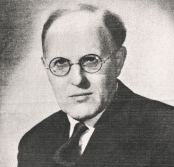 “This ambitious goal needed something special and a special teacher. Enter K.L.E.W. Woodland or Clue (as in “I haven’t a …”) as he was known to staff and pupils alike. But he did (… have a clue). He was one of the many middle-aged bachelor teachers on the staff, who appeared to have been left behind by life. Disruption to career and life in general was almost certainly a consequence of the war.”
“This ambitious goal needed something special and a special teacher. Enter K.L.E.W. Woodland or Clue (as in “I haven’t a …”) as he was known to staff and pupils alike. But he did (… have a clue). He was one of the many middle-aged bachelor teachers on the staff, who appeared to have been left behind by life. Disruption to career and life in general was almost certainly a consequence of the war.”
Yet while some of the teachers were a little embittered, KLEW, who was rumoured to have worked with British Intelligence at Bletchley Park and to have been a spy in Germany in the 1930s, was different. “Sure, he had a dry, sardonic wit, but it never came across as spiteful. In his grey suit and chalky gown, you felt he knew his stuff and that he liked his pupils, which could not have been easy.”
KLEW’s greatest contribution to Tony’s motivation and interest in learning German was his work in organising the Easter holiday exchange visits. “Clearly KLEW had his contacts in Germany and made them work.” He is in fact doubly indebted to his old teacher: although costs for the first trip, to Dortmund, were kept low, money was tight for Tony’s family and they could not afford it, so KLEW secured a scholarship from Hertfordshire County Council.
The trips not only featured time in a German Gymnasium (grammar school) and visits to industrial sites, but also more unexpected opportunities, such as the chance to sample copious quantities of wine with the exotic Graf Matuschka, a German count who was the co-ordinator for the 1962 exchange.
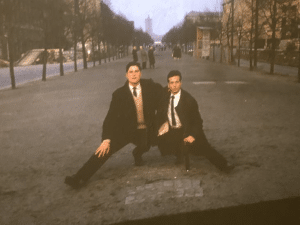 “The exchange visits, in addition to experiencing German, Germans and Germany first-hand, developed me personally. As the Gruppenleiter, I was spokesman for our group, liaised with the local contacts and made small speeches of thanks at the steelworks and the brewery, hastily scribbled on the back of beer mats. In a strange way I felt less constrained and more confident abroad than back home in London, which probably explains why I have spent so much of my time outside the UK.” Tony is pictured here with his friend and classmate, Colin Lennard, on a visit to Berlin in 1963.
“The exchange visits, in addition to experiencing German, Germans and Germany first-hand, developed me personally. As the Gruppenleiter, I was spokesman for our group, liaised with the local contacts and made small speeches of thanks at the steelworks and the brewery, hastily scribbled on the back of beer mats. In a strange way I felt less constrained and more confident abroad than back home in London, which probably explains why I have spent so much of my time outside the UK.” Tony is pictured here with his friend and classmate, Colin Lennard, on a visit to Berlin in 1963.
With the British Council having reported this year that language-learning is still in decline in England’s schools, Tony, who recently got in touch with QE’s Head of Languages, Nora Schlatte, is “pleasantly surprised” to hear that QE’s German department is thriving. (Twelve boys completed a German A-level in the summer.)
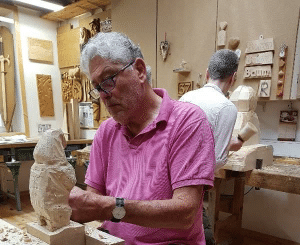 He went on from QE to read German at Nottingham University from 1963-1966, which included half a year in Freiburg. “My main memory is playing rugby for the university and being selected for Notts, Lincs and Derby and UAU Midlands. Rugby shadowed my travels and I also played for Frankfurt SC 1880 and, in the twilight of my rugby career, for Stockholm Exiles RFC.” One key difference with UK rugby union is that the Swedish season runs from May to September: “snow and ice are better suited to ice hockey!
He went on from QE to read German at Nottingham University from 1963-1966, which included half a year in Freiburg. “My main memory is playing rugby for the university and being selected for Notts, Lincs and Derby and UAU Midlands. Rugby shadowed my travels and I also played for Frankfurt SC 1880 and, in the twilight of my rugby career, for Stockholm Exiles RFC.” One key difference with UK rugby union is that the Swedish season runs from May to September: “snow and ice are better suited to ice hockey!
“After university I embarked on what was retrospectively a self-organised gap year, albeit lasting two years.” This involved initially going to Sweden to teach English. “I then drifted into the travel business and was a resort representative for a Swedish tour operator in Dubrovnik, in what was then Tito’s Yugoslavia.”
He subsequently returned to the UK and was recruited as a graduate trainee by the mighty ICI (Imperial Chemical Industries), then Britain’s biggest manufacturer. “My final interview before joining ICI in 1967 was with a director. He told me I would be based in Runcorn. As a Londoner, I had no idea where Runcorn was, so I asked him. The answer was priceless: ‘If you imagine the Mersey as the arsehole of England, then Runcorn’s half-way up it.’”
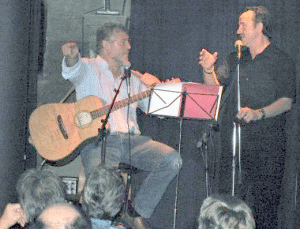 He eventually concluded that it was not the career for him – “Selling salt, soda and various acids in Stoke-on-Trent was not my cup of coffee” – and after some three years he moved back into teaching. He was appointed to a role in charge of marketing specialist EFL [English as a Foreign Language] courses for the Colchester English Study Centre, a subsidiary of Oxford University Press.
He eventually concluded that it was not the career for him – “Selling salt, soda and various acids in Stoke-on-Trent was not my cup of coffee” – and after some three years he moved back into teaching. He was appointed to a role in charge of marketing specialist EFL [English as a Foreign Language] courses for the Colchester English Study Centre, a subsidiary of Oxford University Press.
“There then followed a four-year period of experimenting, searching and despair, finally ending in 1974 with my setting up my own EFL organisation, Target Language Services, focusing on teaching English to companies and their managers.” Individual managers came to the language school in London, while Tony and his trainers also ran in-house programmes for German companies, such as Bosch, Siemens and Daimler, in Germany.
In 1980, he went back to Sweden with his family (his first wife, Chris, being Swedish). “I sort of dropped out, closed the school in London and focused on developing and delivering in-house seminars in Germany. A senior manager at one of my clients, Schering Pharmaceuticals, then convinced, and helped, me to refocus on personal and organisational development. My USP was running management training programmes in English for German companies with international subsidiaries, which was almost all of them.”
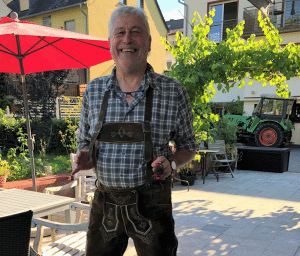 Through learning on the job and imitating the successes of others, he developed his skills. “I started to cooperate with UK-based training and development organisations by delivering their programmes in Germany in German and English. By this time, 1976, I had left Sweden and moved to Germany.”
Through learning on the job and imitating the successes of others, he developed his skills. “I started to cooperate with UK-based training and development organisations by delivering their programmes in Germany in German and English. By this time, 1976, I had left Sweden and moved to Germany.”
The 1980s brought two important career developments for Tony. “First of all, I became a partner at Consensus Consulting, which became – and is to this day – the vehicle for my management training courses.
“The second development sprang from a chance conversation with one of the ex-pat rugby players in Frankfurt. He was interested in my now-dormant EFL interests, so Target Language Services was resurrected and re-launched as Target Training. Over the years I have been involved with these two organisations, and still have shares – and an emotional interest – in both companies.”
From 1990 – 2010, Tony developed and ran training projects in the US, UK, Germany, Scandinavia and the Far East. The fall of the Berlin Wall and German reunification also presented opportunities in the ex-communist countries in Eastern Europe. If he were pressed to specify what his focus was during this period, Tony says it would have been “international leadership and intercultural communication and cooperation”.
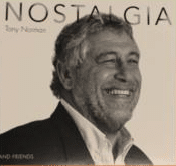 Tony carried on working until his early 70s and today keeps busy through his hobbies. These include music: “I have always dabbled in pop, rock and blues.” He played drums with a band, the Square Pegs, while at Nottingham, and also played the guitar. Family and work commitments prevented him from pursuing this much until recent years, when he started jamming with a number of musicians. “This culminated in the making of my Nostalgia CD and, a year later, my debut and farewell concert, both on the same evening, at the Wienerhof in Offenbach-Bieber.” The concert near Frankfurt, which featured Tony Norman and The Nostalgia All Stars, took place in 2018.
Tony carried on working until his early 70s and today keeps busy through his hobbies. These include music: “I have always dabbled in pop, rock and blues.” He played drums with a band, the Square Pegs, while at Nottingham, and also played the guitar. Family and work commitments prevented him from pursuing this much until recent years, when he started jamming with a number of musicians. “This culminated in the making of my Nostalgia CD and, a year later, my debut and farewell concert, both on the same evening, at the Wienerhof in Offenbach-Bieber.” The concert near Frankfurt, which featured Tony Norman and The Nostalgia All Stars, took place in 2018.
He has two daughters with his first wife, Annika and Katja. Besides music and spending time with family and friends, Tony says “I garden, do wood-carving and try to become a wine connoisseur. Prost! – or, your health!”
